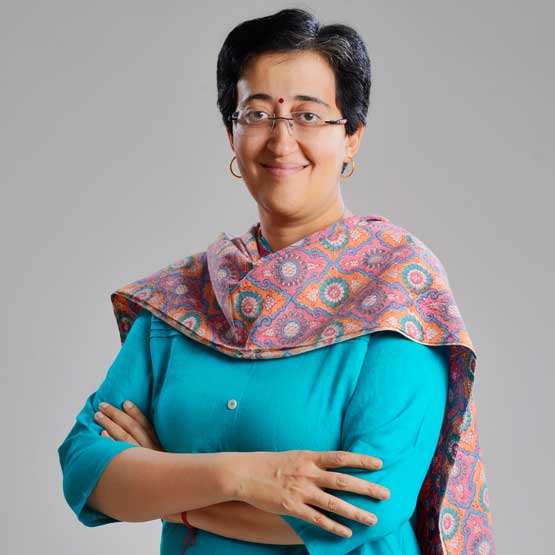Atishi Marlena: A Historical Trailblazer
Atishi Marlena, an Indian politician and education reformer, has made significant contributions to improving the education system in India.
Atishi Marlena, born on May 30, 1981, in New Delhi, India, is an alumnus of the prestigious St. Stephen's College, Delhi, and the University of Oxford, where she studied philosophy, politics, and economics. Her passion for education reform began during her time as a volunteer teacher in a Delhi slum, where she witnessed firsthand the challenges faced by underprivileged children in accessing quality education.
In 2013, Atishi joined the Aam Aadmi Party (AAP) and was elected as a member of the Delhi Legislative Assembly from the Kalkaji constituency. As the AAP's Education Minister from 2015 to 2018, she played a pivotal role in implementing several innovative and impactful education reforms in Delhi's government schools, including the "Happiness Curriculum," focused on promoting emotional well-being and life skills among students, and the "Chunauti Scheme," aimed at improving learning outcomes in mathematics and English for students in grades 6 to 8.
Atishi's contributions to education reform have been widely recognized and appreciated. She was awarded the Ramon Magsaysay Award in 2020 for her exceptional work in improving the lives of marginalized communities through innovative approaches to governance. Her efforts have not only transformed the education landscape in Delhi but have also inspired and influenced education reforms across India, making her a respected and influential figure in the field of education.
Atishi Marlena's Contributions to Education Reform
Atishi Marlena's contributions to education reform in India are multifaceted, encompassing policy initiatives, curriculum development, and teacher training programs.
Policy Initiatives
-Implementation of the "Happiness Curriculum": This curriculum emphasizes the development of emotional well-being, empathy, and life skills among students, recognizing the importance of holistic education. -Introduction of the "Chunauti Scheme": This scheme aims to improve learning outcomes in mathematics and English for students in grades 6 to 8 through additional support and targeted interventions. -Expansion of pre-primary education: Atishi played a crucial role in expanding access to pre-primary education by establishing new pre-schools and integrating them into the formal education system.Curriculum Development
-Revision of the school curriculum: Under Atishi's leadership, the Delhi government revised the school curriculum to make it more relevant, engaging, and reflective of the changing needs of students.-
Incorporation of experiential learning: Atishi promoted experiential learning by introducing hands-on activities, projects, and field trips into the curriculum, aiming to make learning more interactive and practical.Teacher Training Programs
-Establishment of the Teacher Training Academy: Atishi recognized the importance of well-trained teachers and established a dedicated Teacher Training Academy to provide professional development opportunities for teachers. -Focus on teacher well-being: She introduced initiatives to support teacher well-being, including stress management workshops and counseling services.Frequently Asked Questions about Atishi Marlena's Contributions to Education Reform
This section addresses some common questions and misconceptions surrounding Atishi Marlena's work in education reform.
Question 1: What was the primary focus of Atishi Marlena's education reforms?
Atishi Marlena's education reforms focused on improving the quality of education in Delhi's government schools, with a particular emphasis on providing holistic education, improving learning outcomes, and supporting teachers.
Question 2: How did Atishi Marlena's reforms impact students in Delhi?
Atishi Marlena's reforms aimed to create a more engaging and supportive learning environment for students. Initiatives such as the "Happiness Curriculum" and the "Chunauti Scheme" were designed to promote emotional well-being, develop life skills, and improve academic performance.
Summary: Atishi Marlena's contributions to education reform in Delhi have been significant and impactful, leading to improved educational outcomes and a more holistic approach to education.
Conclusion
Atishi Marlena's contributions to education reform in India, particularly in Delhi, have been transformative and far-reaching. Her innovative policies, curriculum development initiatives, and teacher training programs have significantly improved the quality of education in government schools, benefiting countless students and shaping the future of education in India.
Marlena's work serves as an inspiration, demonstrating the power of dedicated individuals to drive positive change and improve the lives of marginalized communities. Her legacy will continue to influence education reform efforts in India and beyond, ensuring that every child has access to quality education and the opportunity to reach their full potential.
The Comprehensive Guide To Mellstroy Networks
The Father-Son Duo Of Hollywood: Kiefer And Donald Sutherland's Unbreakable Bond
Ryan Eggold's Journey As A Father: Embracing Fatherhood And Family Life

